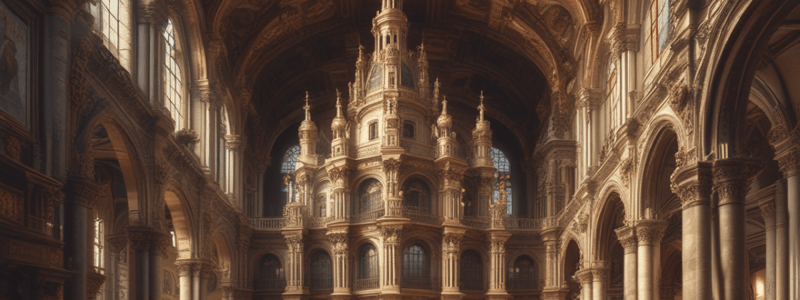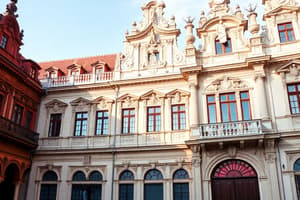Podcast
Questions and Answers
Baroque church architecture emerged in the early 16th century
Baroque church architecture emerged in the early 16th century
False (B)
St. Peter's Basilica represents a synthesis of Renaissance and Gothic architectural styles
St. Peter's Basilica represents a synthesis of Renaissance and Gothic architectural styles
False (B)
Baroque architecture uses natural light to create dramatic contrasts
Baroque architecture uses natural light to create dramatic contrasts
True (A)
The facade of St. Peter's Basilica was designed by Bernini
The facade of St. Peter's Basilica was designed by Bernini
St. Peter's Basilica is one of the smallest churches in the world
St. Peter's Basilica is one of the smallest churches in the world
The dome of St. Peter's Basilica was designed by Carlo Maderno.
The dome of St. Peter's Basilica was designed by Carlo Maderno.
The nave of St. Peter's Basilica features a flat roof.
The nave of St. Peter's Basilica features a flat roof.
The Baldachin in St. Peter's Basilica was designed by Donato Bramante.
The Baldachin in St. Peter's Basilica was designed by Donato Bramante.
The piazza in front of St. Peter's Basilica is circular in shape.
The piazza in front of St. Peter's Basilica is circular in shape.
Baroque gardens were less elaborate than Renaissance Gardens.
Baroque gardens were less elaborate than Renaissance Gardens.
The Vatican Gardens date back to the 16th century.
The Vatican Gardens date back to the 16th century.
Isola Bella is a small island in Lake Como.
Isola Bella is a small island in Lake Como.
The gardens of Isola Bella are laid out in five terraces.
The gardens of Isola Bella are laid out in five terraces.
Access to the Vatican Gardens is open to the general public.
Access to the Vatican Gardens is open to the general public.
The Lourdes Grotto in the Vatican Gardens is a place of pilgrimage and prayer.
The Lourdes Grotto in the Vatican Gardens is a place of pilgrimage and prayer.
Flashcards are hidden until you start studying
Study Notes
Baroque Architecture
- Emerged in the late 16th century and flourished in the 17th and early 18th centuries
- Characterized by:
- Extravagant decoration
- Curves and painted ceilings
- Dramatic use of light
- Bold ornamentation
- Sense of movement and grandeur
- Part of the Counter-Reformation's effort to attract and inspire the faithful through awe-inspiring designs
- Also used in great palaces built throughout Europe
St. Peter's Basilica, Vatican City
- One of the most renowned works of Renaissance and Baroque architecture
- Synthesis of Renaissance and Baroque architectural styles
- One of the largest churches in the world
- Built over the traditional site of St. Peter's tomb
- Rich architectural history with contributions from several illustrious architects of the Renaissance period
Façade
- Designed by Carlo Maderno and completed in 1614
- Massive structure featuring a central entrance flanked by colossal Corinthian columns and pilasters
- Crowned by a giant pediment and statues of Christ, apostles, and saints
Dome
- Designed by Michelangelo
- One of the largest domes in the world
- Supported by four massive piers and rises to a height of 136.57 meters (448.1 feet) from the floor of the basilica to the top of the cross
- Iconic symbol of the basilica and can be seen from across Rome
Nave
- Designed by Carlo Maderno
- Vast and richly decorated
- Features a coffered barrel vault
- Lined with a series of chapels and niches
- Interior decoration includes works by several renowned artists, including Bernini
Canopy / Baldachin
- Designed by Gian Lorenzo Bernini
- Intended to mark the place of Saint Peter's tomb underneath
- Historically a baldachin is a cloth canopy of state typically placed over an altar, throne, or even the bed of a monarch
- Represents an important development in Baroque church interior design
Piazza
- Designed by Gian Lorenzo Bernini
- Elliptical piazza in front of the basilica
- Enclosed by a monumental colonnade consisting of four rows of Doric columns
- Sweeping arms of the colonnade embrace visitors in a grand architectural gesture
Baroque Gardens
- Became outdoor extensions of the interior living spaces of a villa
- Created as sanctuaries from the outside world
- More elaborate than Renaissance Gardens
- Often enormous and complex
- Contained statuary and water features
- Goal of sweeping vistas towards the sea, lakes, and mountains
Vatican Gardens
- Date back to medieval times
- Historically a place of reflection and retreat for the Popes since the early 13th century
- Feature chapels, grottoes, and monuments
- Limited access, requiring a guided tour
Isola Bella
- A prime example of Baroque architecture and formal gardens
- Occupies a small island in Lake Maggiore
- Construction of the Villa Borromeo and its gardens began in 1632
- Gardens finally inaugurated in 1671
- Became a place of sumptuous parties and theatrical events for the nobility of Europe
- Palace features grand staircases, richly decorated rooms, and intricate frescoes
- Gardens are laid out in ten terraces, resembling a stepped pyramid
- Embellished with numerous statues, obelisks, and fountains
Studying That Suits You
Use AI to generate personalized quizzes and flashcards to suit your learning preferences.





